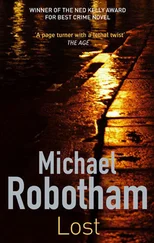I look for Felix. A dark shape is pinned beneath the rear axle of the car. Unmoving.
A paramedic crawls beneath the wheel arch. “This one’s gone,” he yells.
Another slides his hands beneath mine, taking hold of Cate’s head. Two of them work on her.
“Airways are blocked. Using the Guedels.”
He puts a plastic curved tube in her mouth and suctions out blood.
“One seventy systolic over ninety. Right pupil dilated.”
“She’s hypotensive.”
“Put a collar on.”
Someone talks into a two-way. “We got serious head trauma and internal bleeding.”
“She’s pregnant,” I hear myself saying. I don’t know if they hear me.
“BP is climbing. Low pulse.”
“She’s bleeding into her skull.”
“Let’s get her inside.”
“She needs volume now.”
The spine board is placed beside her and Cate is log-rolled onto her side and lifted onto a stretcher.
“She’s pregnant,” I say again.
The paramedic turns to me.
“Do you know her?”
“Yes.”
“We got room for one. You can ride up front.” He is pumping a rubber bag, forcing air into her lungs. “We need her name, DOB, address—is she allergic to any drugs?”
“I don’t know.”
“When is she due?”
“In four weeks.”
The stretcher is in the ambulance. The paramedics climb inside. A medical technician hustles me into the passenger seat. The door shuts. We’re moving. Through the window I see the crowd staring at us. Where did they all come from? Donavon is sitting in the gutter, looking dazed. I want him to look at me. I want to say thank you.
The paramedics continue working on Cate. One of them talks into a two-way using words like bradycardia and intracranial pressure. A heart monitor beeps out a broken message.
“Is she going to be all right?”
Nobody answers.
“What about the baby?”
He unbuttons her blouse. “I’m running two units.”
“No, wait. I’ve lost her pulse.”
The monitor flatlines.
“She’s asystolic!”
“Starting compressions.”
He rips open the final buttons, exposing her bra and torso.
Both paramedics suddenly stop and raise their eyes to each other—a single look, no words, but it conveys everything. Strapped to Cate’s midriff is a large piece of upholstery foam, trimmed to fit over her stomach. The prosthetic is pulled away. Cate is “pregnant” no more.
Pushing down hard on her chest, a paramedic counts the compressions, yelling the numbers. The heart monitor is competing with the siren.
“No response.”
“We might have to crack her open.”
“One amp of adrenaline.” He bites off the cap and stabs the contents into her neck.
The next few minutes pass in a blur of flashing lights and fractured conversations. I know they’re losing her. I guess I’ve known it all along. The dilated pupils, the bleeding inside her head—the classic signs of brain injury. Cate is broken in too many places to fix.
A thin green line on the monitor rises and falls and flattens again. They’re counting each inflation with the chest compressions. One squeeze to every five compressions.
“Thommo.”
“What?”
“I’m stopping the chest compressions.”
“Why?”
“Because they’re making her brains come out of her head.”
Cate’s skull is broken behind her right ear.
“Keep going.”
“But—”
“Just keep going.”
Half a minute passes. Hard as they try, Cate’s heart won’t answer.
“What are you going to do?”
“Crack her chest.”
A wave of nausea washes into my mouth. I don’t remember the rest of the journey or arriving at the hospital. There are no crashing doors or white coats rushing down corridors. Instead, everything appears to slow down. The building swallows Cate whole, less than whole, damaged.
Hospitals, I hate them. The smell, the pall of uncertainty, the whiteness. White walls, white sheets, white clothes. The only things not white are the bodily fluids and the Afro-Caribbean nurses.
I’m still standing near the ambulance. The paramedics return and begin mopping up the blood.
“Are you gonna be OK?” one of them asks. The pillow of upholstery foam hangs from his fist. The dangling straps look like the legs of a strange sea creature.
He hands me a damp paper towel. “You might want to use this.”
I have blood on my hands; blood all over my jeans.
“You missed a bit.” He motions to my cheek. I wipe the wrong one.
“Here, do you mind?”
He takes the towel and holds my chin in the palm of his hand, wiping my cheek. “There.”
“Thank you.”
He wants to say something. “Is she a close friend?”
“We went to school together.”
He nods. “Why would she—I mean—why did she fake a pregnancy?”
I glance past him, unable to answer. It doesn’t serve any purpose and makes even less sense. Cate needed to see me. She said they wanted to take her baby. What baby?
“Is she—will she be OK?”
It’s his turn to not answer. The sadness in his eyes is rationed carefully because others will need it later.
A hose spits. Pink water swirls down the drain. The paramedic hands me the prosthetic and I feel something break inside me. Once I thought I had lost Cate forever. Maybe this time I have.
Hospital waiting rooms are useless, helpless places, full of whispers and prayers. Nobody wants to look at me. I have tried to clean Lindsay’s top in the bathroom, scrubbing it under the tap with hand soap. I only managed to spread the stain around.
Doctors and nurses wander in and out, never able to relax. One patient on a trolley looks like a fly caught in a web of tubes and wires. The skin around his mouth is puckered and dry.
I have never really thought about death. Even when I was lying in hospital with pins holding my spine together, it didn’t occur to me. I have faced off suspects, pursued cars, charged through doorways and walked into abandoned buildings but have never thought that I might die. Maybe that’s one of the advantages of having little self-value.
A nurse has taken down details of Cate’s family. I don’t know about Felix. His mother might still be alive. Nobody can tell me anything except that Cate is in surgery. The nurses are relentlessly positive. The doctors are more circumspect. They have the truth to contend with—the reality of what they can and cannot fix.
In the midst of an ordinary evening, on a quiet street, a couple are hit by a car. One is dead. The other has horrific injuries. What happened to Cate’s other shoe? What happened to her baby?
A policeman arrives to interview me. He is my age, wearing a uniform with everything polished and pressed. I feel self-conscious about my appearance.
He has a list of questions—what, where, when and why. I try to remember everything that happened. The car came out of nowhere. Donavon yelled.
“So you think it was an accident?”
“I don’t know.”
In my head I can hear Donavon accusing the driver of running them down. The policeman gives me a card. “If you remember anything more, give me a call.”
Through the swing doors, I see Cate’s family arriving. Her father, her mother in a wheelchair, her older brother, Jarrod.
Barnaby Elliot’s voice is raised. “What do you mean there’s no baby? My daughter is pregnant.”
“What are they saying, Barnaby?” his wife asks, tugging at his sleeve.
“They’re saying she wasn’t pregnant.”
“Then it mustn’t be our Cate. They have the wrong person.”
The doctor interrupts. “If you’ll just wait here, I’ll send someone to talk to you.”
Читать дальше












